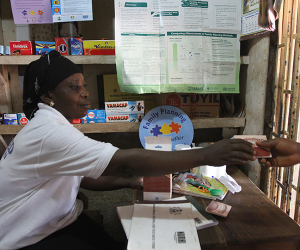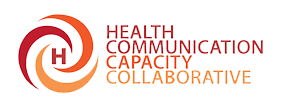Example: Summarizing the Core Challenge
Nigerian Urban Reproductive Health Initiative

A patient medicine provider attends to a client after a family planning prescription in her outlet at Iwalesin district, Omuaran township, Kwara state, Nigeria.
© 2012 Akintunde Akinleye/NURHI, Courtesy of Photoshare
Nigeria had a promising national family planning program (boosted by a national family planning/child spacing logo) in the late 1980s and a robust behavior change communication and advocacy program. Significant investments designed to increase the quality and availability of services have since declined, including contraceptive supplies and management capacity. Overall, total unmet family planning need is 21% (2008 NDHS) and higher in urban areas compared with the rural areas.
Exposure to mass media messaging on family planning is a strong predictor of contraceptive use and intention to use contraception. Currently, intention to use contraceptives averages about 28 percent in the selected cities (Abuja FCT, Ibadan, Kaduna, Ilorin, Benin City and Zaria) targeted by the Nigerian Urban Reproductive Health Initiative (NURHI). This indicates the potential that exists to raise contraceptive prevalence rate in Nigeria with the right combination of resources and strategy. The current landscape for family planning in Nigeria engenders optimism. Commitment among public health and reproductive health professionals and organizations runs deep. Private sector (NGO, faith-based and for-profit) service delivery capacity is extensive, and most Nigerians already access some form of health care from them.
Core Challenge
Focus group discussions and the NURHI baseline assessment showed that among those of reproductive age, family planning is framed by fear, misconceptions and mistrust. Challenges that emerged include:
- Women and men have a number of misconceptions about family planning and some methods in particular. The fear of negative health impact proves to often be a serious barrier in considering family planning.
- The fear of family planning persists on a number of levels: fear of discussion and approval of spouse, fear of destroying relationships, fear of testing, and fear of health consequences and side effects.
- Burden of FP use is on the woman. Once the woman has the information and is convinced, she still has to convince her husband/ partner about family planning. It was unanimously felt that if family planning is adopted without the husband’s knowledge/ approval, there would be suspicion of infidelity if the woman was discovered.
- Family planning is felt to be difficult to discuss and discussion requires lots of knowledge.
- Family planning is seen as not easy to use and highly ‘medicalized’. Only doctors can prescribe or tell a woman what method to use. She needs many tests and exams before a choice can be recommended.
- Family planning is considered to be very risky compared to other risks related to pregnancy. Sterilization and IUDs are considered especially risky. Modern family planning methods are seen as riskier than the risks related to child bearing such as having a child before the age of 18, having closely spaced births or having more than six children. Natural family planning methods were seen as less risky in comparison to modern methods.
Core Challenge Statement: To address the core challenge of fear and mistrust, the NURHI communication strategy will focus on opening a public dialogue on family planning; establishing the social acceptability of family planning; increasing accurate knowledge about the methods and access points; bringing family planning discussion into everyday life, particularly among couples; and ultimately increasing and sustaining use. To this end, the NURHI communication strategy will operate at multiple levels, will be closely tied to supply side activities, and will center on making family planning a part of everyday life.

